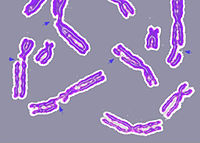
Photo from wikipedia
Plants live in constantly changing and often unfavorable or stressful environments. Environmental changes induce biotic and abiotic stress, which, in turn, may cause genomic DNA damage. Hence, plants simultaneously suffer… Click to show full abstract
Plants live in constantly changing and often unfavorable or stressful environments. Environmental changes induce biotic and abiotic stress, which, in turn, may cause genomic DNA damage. Hence, plants simultaneously suffer abiotic/biotic stress and DNA damage. However, little information is available on the signaling crosstalk that occurs between DNA damage and abiotic/biotic stresses. Arabidopsis thaliana SUPPRESSOR OF GAMMA RESPONSE1 (SOG1) is a pivotal transcription factor that regulates thousands of genes in response to DNA double-strand break (DSB), and we recently reported that SOG1 has a role in immune responses. In the present study, the effects of SOG1 overexpression on the DNA damage and immune responses were examined. Results found that SOG1 overexpression enhances the regulation of numerous downstream genes. Relative to the wild type plants, then, DNA damage responses were observed to be strongly induced. SOG1 overexpression also upregulates chitin (a major components of fungal cell walls) responsive genes in the presence of DSBs, implying that pathogen defense response is activated by DNA damage via SOG1. Further, SOG1 overexpression enhances fungal resistance. These results suggest that SOG1 regulates crosstalk between DNA damage response and the immune response and that plants have evolved a sophisticated defense network to contend with environmental stress. Overexpression of SOG1 enhances various DNA damage responses and fungal resistance, suggesting that SOG1 regulates the crosstalk between the DNA damage response and immune responses.
Journal Title: Plant Molecular Biology
Year Published: 2020
Link to full text (if available)
Share on Social Media: Sign Up to like & get
recommendations!